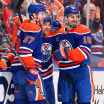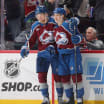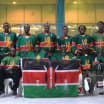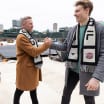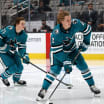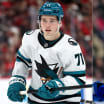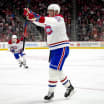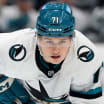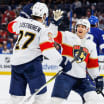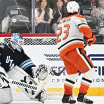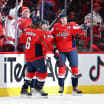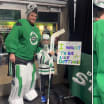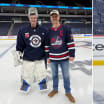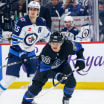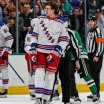DETROIT -- Ted Lindsay has forever been his own man, a strong-willed, outspoken voice and a respected and feared player in his day. Just as he was then, he is not reluctant to speak his mind.
A few months from his 91st birthday, the Hockey Hall of Fame member and Detroit Red Wings legend has softened - a little - with age. Where the man once known as "Terrible Ted" still has strong views on his days as an NHL superstar, he has a marshmallow core that sees him hugely admired for his charity and community work.
Lindsay touched on a variety of topics during an extensive interview at Joe Louis Arena this week. Here are some highlights:
The world according to Lindsay
'Terrible Ted' Lindsay shares his thoughts on childhood, Stanley Cup and boycotting his own Hall of Fame induction
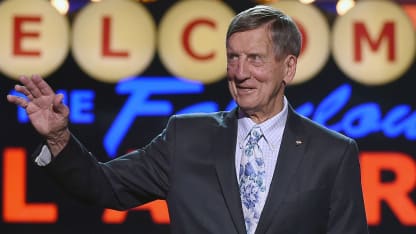
© Ethan Miller/Getty Images
Sunday Long Read: Lindsay on foes: 'I had no friends' >>
On Lindsay's childhood in Kirkland Lake, Ontario:
"Every school had two rinks in the backyard. Our normal winter, it was 15 below zero. There was no wind chill [factor] at that time, it was just temperature. We'd have snowstorms that could fill the rink to the top of the boards and the teachers would say, 'Get your homework done and I'll let you out of class early. With a game Saturday, there's a lot of shoveling to do.' It was always easy at the start of winter - you'd just throw the snow over the boards. But come Christmastime you needed somebody up top shoveling it back. That was the love of the game."
On whether he ever got grief from friends in Kirkland Lake for being a Red Wings fan in the heart of Toronto Maple Leafs country:
"No. I don't know whether it was because of my personality. I wasn't belligerent. I was my own person, my own man. I guess I kind of knew where I was going. I knew I was focused. I never said it to myself at night or anything, but in my mind I knew I was going to make the National Hockey League."
On whether he remembers the first time he was cut playing hockey (he'd sustain hundreds in his career, requiring about 700 stitches):
"No, it's so far back now. Probably when I was playing for Holy Name [juveniles] in Kirkland Lake. We won the Ontario juvenile championship one year - we beat a team in Port Colborne, Ontario, a team that had [future NHL players] Ted Kennedy and Don Gallinger in the lineup. We should have won it two years in a row but we got [victimized] by a referee in Sudbury [Ontario] in the Northern Ontario finals. We played the championship of the north at 7 o'clock Saturday morning, and the damn referee gave us a double penalty."
On being the youngest of five boys (and nine siblings):
"All of my brothers went through the Second World War. When they went in 1939, I was 14. When they came back, I was playing in the National Hockey League."
On the fact his name is misspelled "Lindsey" on the Stanley Cup for the Red Wings' 1949-50 victory, and how as captain of Detroit he began the tradition of carrying the trophy around the ice for fans to have a closer look:
"[The misspelling] doesn't bother me - as long as we won the Cup. In those days [before shatterproof glass], everything was chicken wire at the end of the rink, from the faceoff dots and around behind the net. Where the screen ended, the fans would sit this way (Lindsay leaned on the desk, as if hanging over the ice). They'd move back when the play came. These were the people who paid my salary. When I saw the damn Cup sitting on a table after Clarence (Campbell, the NHL president) presented it to (Red Wings GM Jack) Adams, I guess I saw these people by the penalty box. So I just picked it up. Adams was probably thinking, 'What's that idiot Lindsay going to do, throw it?' The fans all wanted to see it: 'Let me see this year or that year.' "
On the Stanley Cup being regarded as the fans' trophy, accessible unlike the premier prize in other major professional sports:
"It should be that way. That's because hockey has made it that way and they should keep it that way. It's a player's whole life. From growing up, kids had Mom and Dad tie their skates until they got strong enough to do it themselves, parents doing their job for them until they graduated to do it themselves. Hockey is a wonderful life."
On boycotting his own Hockey Hall of Fame induction ceremony in 1966 when it was an event for honorees and League officials only, with the families of the inductees not being invited to the luncheon (the policy was changed the following year and the Hall of Fame says Lindsay, "an amazing man," has not missed one ceremony since):
"[Players] are wonderful people when we're winning, but when we go home and we're losing, we're miserable for our wives and our children. My feeling was, families put up with us when we were temperamental idiots, they should be able to enjoy the benefits of what the League is giving us. That's a very simple decision."
On choosing his greatest rival in hockey:
"Everybody. That was the only way I keyed up for games. When I put that uniform on, [from] when they dropped that puck 'til that game was over, that was the enemy."
On vague reports the Montreal Canadiens were interested in trading for him in the 1950s to put him on a line between Maurice Richard, whom Lindsay despised perhaps more than anyone, and Richard's younger brother, Henri:
"Rocket was one of the best right wingers who ever played the game. I'd have felt I'd had [the Red Wings'] Gordie Howe on the right side and now I've got the Rocket. It would have been … interesting."
On relations eventually thawing with Richard, after years of them not speaking to one another, even when they played on the same All-Star team:
"We used to go to functions in Toronto, probably Hall of Fame functions, three or four or five years after we were through playing. I always gave the Rocket a nod and it probably took four or five years before he nodded back. When he finally nodded back, I figured the ice was melting and we were going to be able to have a drink together. He had talent, the greatest right winger with Howe. The biggest problem for Andy Bathgate is that he came into the League with the [New York] Rangers when Rocket and Howe were in their prime. He was overshadowed. He was a great right winger, Bathgate was, but he didn't get the recognition because of those guys."
On the Rocket once telling Lindsay something that moved him profoundly, something he says he will share with no one and will take to his grave:
"That still holds true. It was personal between Rocket and me. It was unexpected. I was really taken aback. I appreciate what he said because we hated each other, it's the only way I can put it."
